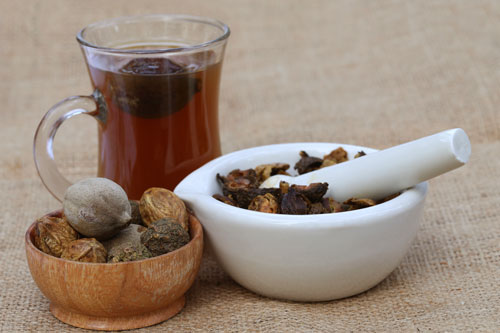Anyone who knows me knows that I believe the traditional Ayurvedic formula called Triphala is the greatest single herbal formula the world has ever known. That’s quite a statement, coming from an herbalist of 40 years experience, author of nine books on herbal medicine, and who knows and has regularly used hundreds of herbs and formulas in clinical practice. An old Indian adage goes, “No mother? No worry, so long as you have Triphala.” For all intents and purposes, I agree.
A recent randomized clinically controlled study which included 90 subjects between 25-40 years old with chronic, generalized gingivitis years found Triphala mouthwash to be effective for the treatment of gingivitis. The study was sponsored by the Government Dental College and Research Institute, Bangalore, India and published in Clinical Trials.gov, which is part of the U.S. National Institute of Health.
The study found that the efficacy of triphala for the treatment of gingivitis was comparable to chlorhexidine (CHX). Why choose Triphala mouthwash over chlorhexidine? It so happens that chlorhexidine carries a wide range of potential risks and side effects that Triphala does not have. These include blistering, burning itching, peeling, skin rash, redness, swelling and other signs of skin irritation. Furthermore, rather nasty side effects can occur on the gastrointestinal tract as a result of using CHX including transient toothache, dental, gingival or oral pain, tenderness, aching, throbbing, soreness, discomfort and sensitivity.
Other than its unappealing taste, Triphala has absolutely no side effects or risks. In fact it has nearly miraculous benefits it can impart to the entire GI tract and the liver.
I’ve written about this remarkable combination of three medicinal fruits many times (see The Wonders of Triphala, Triphala, Honey and Castor Oil for Eyes, and Preventing Seasonal Allergies with Neti, Triphala and Honey). In January 2013, I reported on my experience using Triphala on a 37 year-old male patient suffering for a decade from the worst case of ulcerative colitis I’ve ever seen. Over a year later, he is still virtually symptom-free and continues to take four Planetary triphala capsules three times daily. He now has two normal bowel movements a day with no pain, no bleeding and no diarrhea.
What is it about Triphala that makes it so special as a foundational healing formula? A recent article entitled “Scientific validation of the ethnomedicinal properties of the Ayurvedic drug, Triphala: A review,” published in the December 2012 Chinese Journal of Integrative Medicine fully describes each of the three medicinal fruits of Triphala: Terminalia chebula (haritaki) which regulates the vata or nervous system; Terminalia bellirica (bibhitaki) which regulates the kapha or fluidic mucus system; and Phyllanthus emblica (amlaki), also known as Indian gooseberry, which regulates pitta including the liver and metabolic system of the body.
According to Ayurvedic philosophy, Triphala is ‘tridosha’ meaning that it treats the whole body by regulating the three basic life humors (doshas), vata, kapha and pitta which must be in balance with each other to manifest health. According to Ayurvedic theory, when the body is out of balance with these three doshas, the result is disease. Triphala being tridosha means that it is a virtual panacea for all diseases.
For more information on Triphala, see my previous blog posts linked above or visit:
http://www.shareayurveda.com/ayurveda-blogs/benefits-triphala/


Nice one Michael am planning on adding this to an edited version of “The Wonder of Triphala” for The Herbalist – APA (Ayurvedic Practitioners Association) of which I am a member are currently looking for good research docs re Ayurveda – will pass this on if that’s ok with you – john